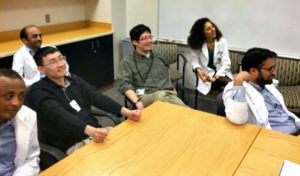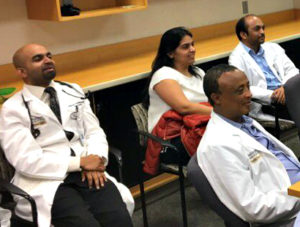The winner of NephMadness 2017 has been decided. In a 5-4 determination of the AJKD Blog blue ribbon panel, Genes in ESKD Disparity beat CRISPR-Cas9.
Over the last four weeks, the educational tournament NephMadness 2017 has played out over the web and social media outlets. The interactive event was a big hit featuring upsets, participation of fellowship programs, the introduction of visual abstracts, and even poetry.

Division of Nephrology fellows and faculty work out a group submission for NephMadness.
The Division of Nephrology scored well in the competition. Congratulations go to Dan Coyne, MD, who had the top score in the Division of Nephrology, ranking 13th overall out of more than 700 brackets.
“Competing in NephMadness was great fun,” says Dr. Coyne. “The twitter banter after each round was mostly in jest. The real value, though, was reading brief informative articles about a wide variety of important clinical and basic research subjects in Nephrology.” He claims that his high ranking is partly due to reading a wide variety of nephrology and medicine literature, and a “huge dose of luck.”
Assistant Professor of Medicine in the Division of Nephrology Tim Yau, social media editor for AJKD Blog and part of the NephMadness Team, facilitated a group submission by the division’s nephrology fellows.
 “The session with the fellows was a lot of fun,” says Yau. “All in all, it was a very successful NephMadness, lots of new faces, new ideas, and great discussion. The fellows’ bracket was a very respectable 114th overall, and 8th amongst all fellowship programs.” The top fellowship program score was from Virginia Commonwealth University.
“The session with the fellows was a lot of fun,” says Yau. “All in all, it was a very successful NephMadness, lots of new faces, new ideas, and great discussion. The fellows’ bracket was a very respectable 114th overall, and 8th amongst all fellowship programs.” The top fellowship program score was from Virginia Commonwealth University.
Regarding his 13th place finish compared to the Wash U Fellows’ 114th place finish, Dr. Coyne has only one thing to say. “Attendings rule, and fellows drool!”
Commenting on the winning topic, Jeffrey Miner, PhD, Division of Nephrology, says, “I think that Genes in ESKD Disparity is a very timely winner. There is so much new information about gene variants in human kidney disease, and the role of APOL1 variants in susceptibility to disease in African Americans is an excellent example that likely pushed this category over the top. I am especially excited by this win because I was involved in a recent study showing that forced expression of the pathogenic APOL1 variants in mouse podocytes causes kidney disease.” The study, published in Nature Medicine, was discussed in a recent post.
For a re-cap of NephMadness 2017, see the accompanying video by social media intern Cathy Quinlan, Pediatric Nephrologist and clinical researcher at Royal Children’s Hospital in Melbourne Australia. Dr. Quinlan is responsible for a series of entertaining NephMadness explainer videos on YouTube.